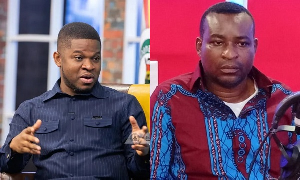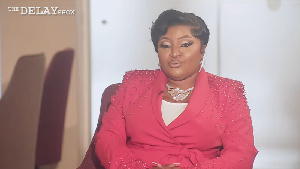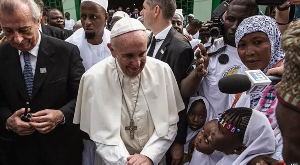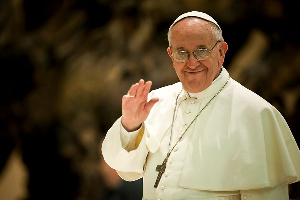Part I
By Dr. Michael J.K. Bokor
E-mail: mjbokor@yahoo.com
December 27, 2009
As we come to the end of yet another year, we must be grateful to the Creator for sustaining our personal lives and securing our national integrity. We have every good cause to celebrate this sustenance, even if we remain the Oliver Twists—wanting more of this providential succour.
We must also congratulate each other for continuing to co-exist peacefully despite our cultural and political differences. Indeed, by braving the storm generated by partisan politics and co-existing peacefully under the banner of our democracy, we have given currency to our motto that we are really “one nation, one people, with one common destiny.” Herein lies the beauty of being Ghanaians.
At least, we have managed to sustain our democracy, replacing peacefully the NDC with the NPP, in one case, and again, the NPP with the NDC at the helm of affairs. This smooth transition is the envy of many a country placed in similar circumstances but unable to hold peaceful elections for a smooth transfer of power from one entity to the other. Those countries have been ravaged by ethnic differences, political intolerance, and waywardness, and have been torn apart, becoming problems unto themselves and others. We chose to do otherwise and must be proud of our achievements.
In this bid, we have done a lot to prove to the skeptics that our choice of this path of national politics wasn’t adventitious and that it came about because we wanted to set our country on an even keel. We are admired the world over for all that we have done to retain our democracy despite the numerous challenges that it has faced over the years. It is for this reason that we must continue to be determined to nurture our democracy to maturity for it to yield all that we need to be able to live our lives in peace, dignity, and fulfillment.
Our democracy is not without danger, though. A careful analysis will reveal that it is threatened by a major factor that nobody seems to be concerned about. There is a vicious cycle of vindictiveness in our national life, which endangers our democracy and must be addressed. I am saying that there is too much wanton vindictiveness in our national politics. We cannot grow our democracy on a platform of vindictiveness.
This penchant for vindictiveness seems to be an outgrowth of the bitterness with which people do politics. Too many people have injected their personal grudge into national politics; thus turning to vindictiveness as a potent tool with which to deal with those they consider as “enemies.”
Throughout the entire political spectrum, the desire to settle personal scores whenever the political pendulum swings in favour of one person, group, or tribe, is too high, for that matter. This negative trend should not have any place in the kind of democracy that we envisage and are doing everything possible to nurture. Using the apparatus of state to wreak wanton vindictiveness runs counter to democracy and we must guard against it. We must not continue to personalize issues for which to seek vengeance at the least opportunity. Our democracy cannot grow if we don’t rise above this level.
Ever since independence, those lucky to be in power have sought to use their power to wreak vengeance on those they consider as their “enemies” or detractors. Whether under a civilian administration or a military one, the trend has been the same. The anger with which the military burst onto the political scene and the brutalities meted out to those perceived as “enemies” is disturbing. The civilian administrations are also culpable for using several means (including the state security apparatus) to wreak vengeance on their “enemies.”
Then, when the political table turns against them, those victims who now find themselves in power also pick up the gauntlet and retaliate, setting in motion this vicious cycle of “do-me-I-do-you.” This retributive (in)justice in national politics is a canker that we must work to eradicate if our democracy should thrive on principled approaches to governance in this 21st century and beyond. One major avenue in which circumstances seem to be created for vindictiveness is the appointment of people to positions of trust. Mind you, I am not saying that those people being appointed to those positions are unfit; my concern is that whether they are ripe for the positions thrust upon them or not, their acts of omission or commission smack of vindictiveness in most senses. They become victims of their own embittered selves and set the wheel of vengeance spinning, sometimes, out of control.
It is undeniable that since the First Republic, the appointment of public office holders has empowered some people to be vindictive. These are people who have an axe to grind with someone or a whole ethnic group (whether in the previous administration or elsewhere). Even in other sectors, conditions have been created for vindictiveness. Kwame Nkrumah, for instance, destooled chiefs opposed to him and appointed his favourites whose actions in some cases had a heavy toll on those opponents.
Now, let’s take matters to the past 9 years in our 4th Republic, starting from the Rawlings era, through that of Kufuor, and settle on the Atta Mills one. We will notice a disturbing prevalence of conditions favourable for vindictiveness and conclude that we still have a lot to do to improve the circumstances under which governance is being effected.
The venom with which Rawlings shot himself into national politics is common knowledge. His AFRC, PNDC, and NDC governments took actions that left no one in doubt that scores were being settled. Granted that Rawlings ruled the country far longer than any other leader, the doings (or misdeeds) of his administration have left lasting imprints that anybody conversant with Ghanaian politics over the past 30 years should not fail to recollect. I will leave matters there, then.
The Kufuor-led NPP took over from Rawlings and, whether by design or accident, acted as if it had chosen him and his followers for a special vengeance. Kufuor appointed into office those who definitely had a huge axe to grind with Rawlings and expended all resources available to them for that purpose. Here are a few instances of how such appointments were grounded in an atmosphere of vindictiveness:
• Kwabena Agyapong, Kufuor’s Press Secretary (whose father was one of those murdered by the Amartei Kwei and Corporal Amedeka-led group of sadists): Throughout his tenure, he never ceased exhibiting hostility toward Rawlings;
• Major Sulemana (National Security Coordinator), Joshua Hamidu (who started with Rawlings in the AFRC but fell out and fled for Kenya), and Francis Poku (formerly of the Special Branch, used by the Limann administration against Rawlings and Capt. Kojo Tsikata and fled into exile at the initiation of the Dec. 31, 1981, military action that brought Rawlings into power): These people manipulated the system to wreak vengeance on anybody or anything associated with Rawlings. We can tell what their fate is now that their party has been subdued.
• Many people perceived as unfavourable to the NPP’s cause lost their jobs in almost all sectors of national life. The case of Hodari Okae is moot now. Many others appointed into office at several levels made no secret of their penchant for retaliation. Many aggrieved people in the Military, Police, Civil Service, etc. sought to exact their pound of flesh from their “enemies” just because their political party was in power.
In comes the Atta Mills government, and the cycle repeats itself. Many of his appointees are obviously embittered against the NPP and will do all they can to seek vengeance. They have already given us an inkling of what they will do if not restrained.
Can we so soon forget the forcible divesting of NPP functionaries of official vehicles and the ejection of Kufuor from the official building at Ridge in Accra, which he intended to use as his personal office? After all, had he not deprived Rawlings of his privileges? How about sending security operatives to Professor Mills’ residence to take away official cars allocated to him? The tone for this vicious cycle in national politics is really loud and harsh!
Opinions of Monday, 28 December 2009
Columnist: Bokor, Michael J. K.














